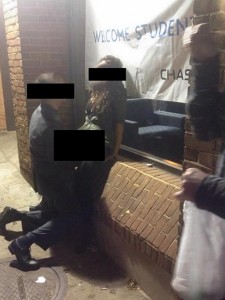What is rape? The answer would seem simple. But, all too often these days, that’s not the case.
On one hand, you’ve got folks who are trying to water down the definition of the word, especially when it comes to statutory rape in cases of adults having sex with minors.
For example, a friend sent me an article about the movement to normalize pedophilia. Haven’t you heard? Adults who are sexually attracted to children are now euphemistically referred to as “minor attracted” individuals, by fringe groups who want to de-stigmatize adult/child sexual attraction.
The article also touches on the efforts of mainstream activists in the GLBT movement to have criminal charges dropped in the case of a 19-year-old Florida woman who had sex with a 14-year-old girl, who, by law, is too young to consent.
Adults who have sex with children are guilty of rape. Period. That should be an issue beyond debate. But, apparently, that’s not the case these days.
 On the other hand, you have cases in which the word “rape” is applied too readily. This week in the national media is reporting the story of an Ohio University student who was filmed and photographed receiving oral sex on the sidewalk by a group of onlookers. The man performed the sex act to the apparent amusement of bystanders and with the apparent consent of the young woman. Within hours, images from the scene had been uploaded to Twitter and Facebook. After the woman awoke the next morning, she called police and reported that the sex had not been consensual and that the onlookers had actually filmed her being raped.
On the other hand, you have cases in which the word “rape” is applied too readily. This week in the national media is reporting the story of an Ohio University student who was filmed and photographed receiving oral sex on the sidewalk by a group of onlookers. The man performed the sex act to the apparent amusement of bystanders and with the apparent consent of the young woman. Within hours, images from the scene had been uploaded to Twitter and Facebook. After the woman awoke the next morning, she called police and reported that the sex had not been consensual and that the onlookers had actually filmed her being raped.
Oddly, however, The New York Daily News reports that the young woman posed with the man for more pictures after the act–a very strange thing to do after one was supposedly raped in public–never mind the fact that she never showed any signs of protest or resistance, nor trying to get away, nor did she say anything to the crowd of onlookers to suggest that she didn’t want the sex to happen.
A woman is leaning back against a wall, with a man kneeling in front of her, with a crowd of onlookers. How hard is it for her to walk away? Or at least shout “No!” or “Help!”
It’s possible she was drunk, of course, which does raise questions of consent. Or that she had been threatened in some way that is not apparent in the photos or film. But it’s also possible that she woke up and found that pictures of her entangled in a sex act were published all over the internet, felt ashamed, and only then decided it had been rape.
Before the media goes about printing rape headlines, they should wait for the facts.
What’s curious, in such a murky case is this, is how the media is so quick to turn this into a national story with headlines that go something like this–“GIRL RAPED WHILE CROWD OF ONLOOKERS DOES NOTHING TO HELP HER!!!!”–instead of applying a bit of scrutiny when there are such obvious doubts and questions about the validity of the claim. But I guess that’s not how you sell papers or generate web traffic.
Using the word “rape” too flippantly only does disservice to future victims, whose valid claims the public is less likely to take seriously if they have read about allegations that later prove to be unfounded. Again, use a little scrutiny. Ask the obvious questions. Wait for the facts.
In this case, the news media who cries “rape” could stand to learn something from the boy who cried “wolf.”
Nathan Harden is editor of The College Fix and author of the book SEX & GOD AT YALE: Porn, Political Correctness, and a Good Education Gone Bad.
Like The College Fix on Facebook. / Follow Nathan on Twitter @NathanHarden
(Image source: @vy_vance/via Twitter)






Please join the conversation about our stories on Facebook, Twitter, Instagram, Reddit, MeWe, Rumble, Gab, Minds and Gettr.